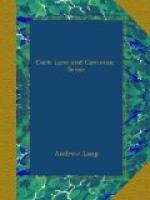THE LOGIC OF TABLE-TURNING
Bias in belief. Difficulty of examining problems in which unknown personal conditions are dominant. Comte Agenor de Gasparin on table-turning. The rise of modern table-turning. Rapping. French examples. A lady bitten by a spirit. Flying objects. The ’via media’ of M. de Gasparin. Tables are turned by recondite physical causes: not by muscular or spiritual actions. The author’s own experiments. Motion without contact. Dr. Carpenter’s views. Incredulity of M. de Gasparin as to phenomena beyond his own experience. Ancient Greek phenomena. M. de Gasparin rejects ‘spirits’. Dr. Carpenter neglects M. de Gasparin’s evidence. Survival and revival. Delacourt’s case. Home’s case. Simon Magus. Early scientific training. Its results. Conclusion.
While reason is fondly supposed to govern our conduct, and direct our conclusions, there is no doubt that our opinions are really regulated by custom, temperament, hope, and fear. We believe or disbelieve because other people do so, because our character is attracted to, or repelled by the unusual, the mysterious; because, from one motive or another, we wish things to be thus, or fear that they may be thus, or hope that they may be so, and cannot but dread that they are otherwise. Again, the laws of Nature which have been ascertained are enough for the conduct of life, and science constantly, and with excellent reason, resists to the last gasp every attempt to recognise the existence of a new law, which, after all, can apparently do little for the benefit of mankind, and may conceivably do something by no means beneficial. Again, science is accustomed to deal with constant phenomena, which, given the conditions, will always result. The phenomena of the marvellous are not constant, or, rather, the conditions cannot be definitely ascertained. When Mr. Crookes made certain experiments on Home’s power of causing a balance to move without contact he succeeded; in the presence of some Russian savants a similar experiment failed. Granting that Mr. Crookes’s tests were accurate (and the lay mind, at least, can see no flaw in them), we must suppose that the personal conditions, in the Russian case, were not the same.
Now an electric current will inevitably do its work, if known and ascertained conditions are present; a personal current, so to speak, depends on personal conditions which are unascertainable. It is inevitable that science, accustomed to the invariable, should turn away from phenomena which, if they do occur, seem, so far, to have a will of their own. That they have a will of their own is precisely their attraction for another class of minds, which recognises in them the action of unknown intelligences. There are also people who so dislike our detention in the prison house of old unvarying laws, that their bias is in favour of anything which may tend to prove




